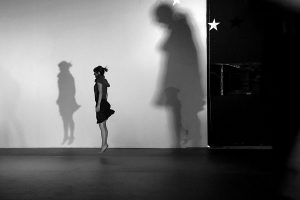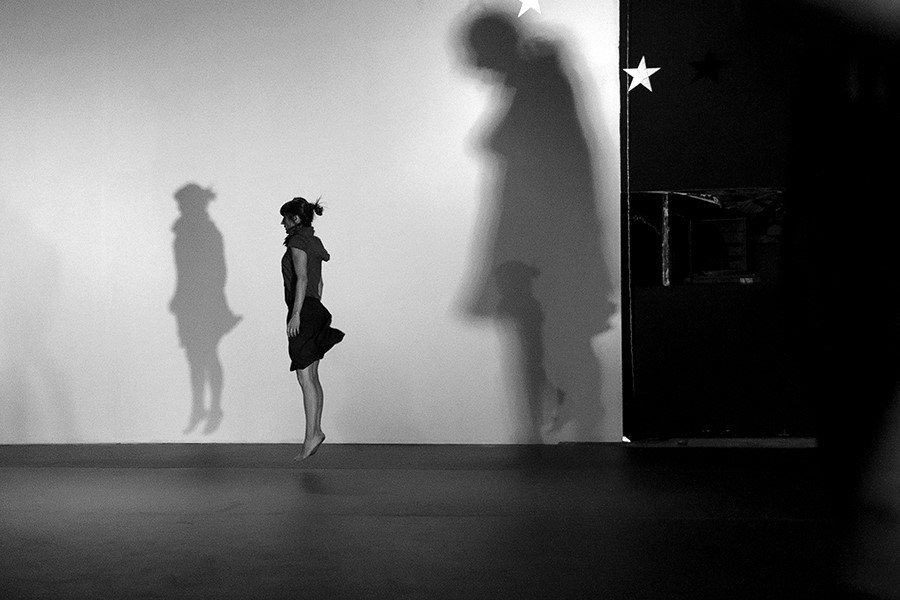I’ve just returned from Athens, where I had the great pleasure of teaching the first group of students to pass through the Duende School of Ensemble Physical Theatre. From October to December 2015, a group of 19 participants from around the world took part in an intensive programme of training in ensemble theatre, movement, voice, rhythm and musicality. This programme led to the performance of a “The Ridiculous Dream”, based on Dostoevsky’s short story “The Dream of the Ridiculous Man”.
The focus of my work with this group was on developing their awareness and understanding of rhythm and musicality in movement and voice. We approached these as a means of creating performance work and connecting as an ensemble, building from the basic principles of pulse and simple rhythmic phrases, we explored the ways rhythm can give form and energy to movement and sound, and weave together the threads of an ensemble. In many ways this work is simple, it asks the performer to do basic actions like walking, clapping, speaking/sounding and familiar physical actions. Yet these simple acts can begin to feel very complicated when we pay attention to when and how we do them in regards to time and rhythm. This one of the curious qualities of rhythm, it has the potential to make our action feel effortless and/or awkward. We encounter moments in this work where we feel like we are flying, carried by the rhythm, and moments when the body feels almost alien, unknown, dysfunctional… ridiculous.

One of the great pleasures in working with this group, besides the broad range of skills and knowledge that they brought to the work, was their willingness to be ‘ridiculous’. I was about to say ‘willingness to fail’, but that is not quite it. There is something joyously profound about a performer who encounters their own ridiculousness and stays present in this meeting, not apologising or dismissing, or attempt to ‘correct’ themselves. Perhaps this was something to group working outside the context of an institutional education system, or a professional production with high pressures of achievement. Or it might have been the result of the groups intensive training with John Britton in the performance principles of ‘Self with Others’ , that allowed them feel safe and open to working in these ways. Whatever the cause, this basic attitude meant that these participants were able to work with rhythm in a way that seems to be far too rare amongst performers – they were able to play with it. Which as Stanislavski pointed out, is one of the best starting points for the actor to work with rhythm.
It would be harmful for you to try and squeeze Tempo-rhythm out of yourselves, or knit your brow and calculate all its complex combinations, like a mindbending mathematical problem. So let’s forget scientific definitions and simply play with rhythm (Stanislavski, An Actor’s Work: A Student’s Diary)
There is something inherently ridiculous about being ‘out’ of rhythm, the clown in the marching band who plays their beat on the triangle just after the song has finished, the feeling of absurdity when attempt to do two different rhythmic actions at the same time (patting your head while rubbing your belly). And while many would laugh at these things, most performers rarely give themselves permission to remain open to their own absurdity while working with the movements and rhythms of their bodies. This is not necessarily about laughing at ourselves or others, but about not running away from our own bewilderment, our incomprehension. Many performers strive to get things right, which is highly admirable and often leads to great work. What I find inspiring is when I see performers who loose it (what ever that might be) and continue to work, exploring all the possibilities and potentialities that come from not knowing, or getting, or being able to do something.
As I settle into living in Glasgow and return to the writing of my book, I find myself reflecting that one of the great challenges of pedagogy and personal development is how can we aspire to greatness while embracing the fact that we will spend a lot of our time stumbling around in the dark.
